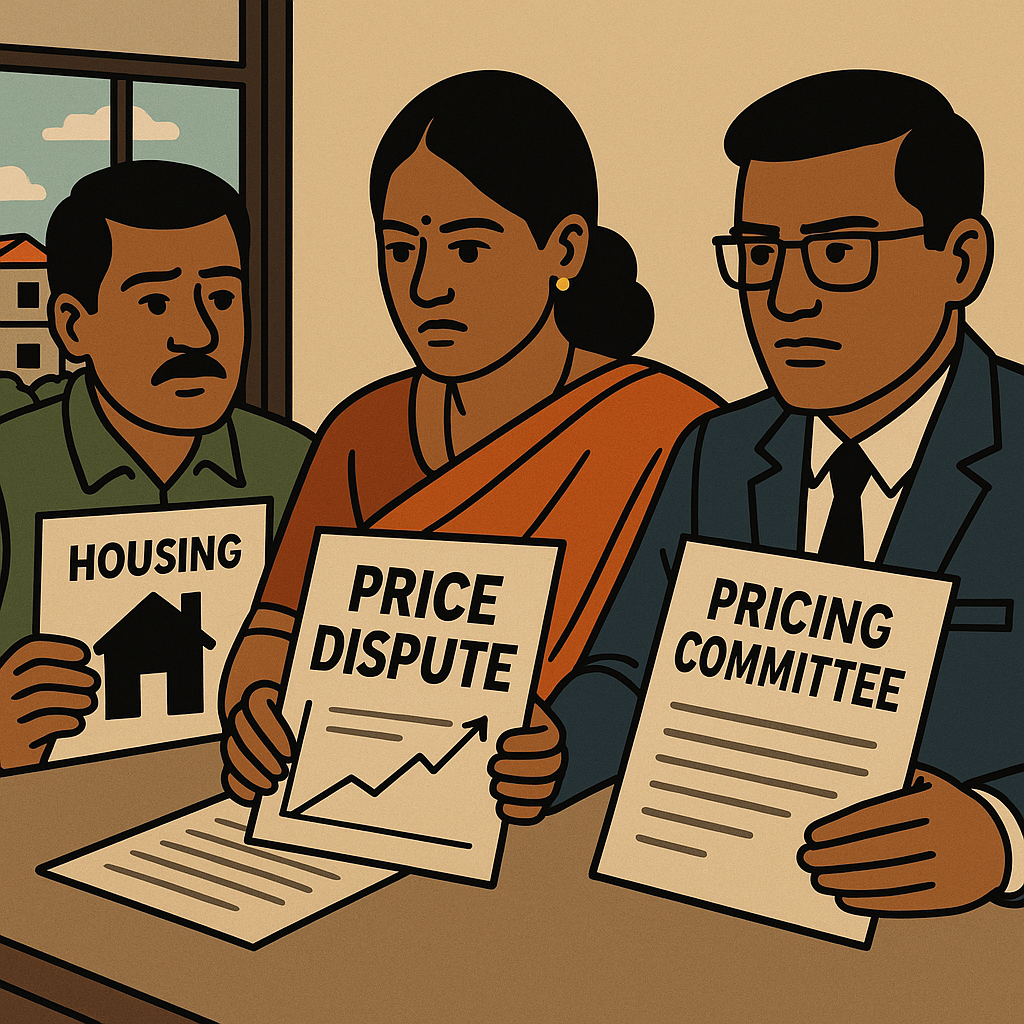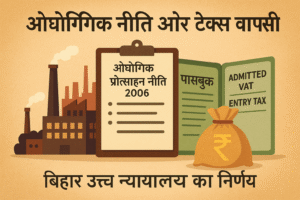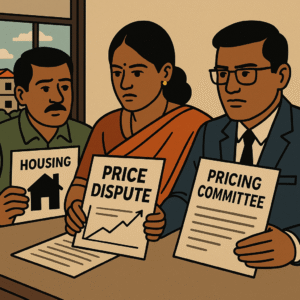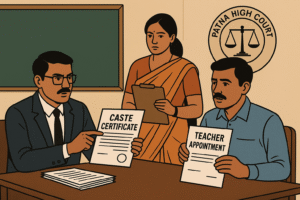The petitioner approached the Patna High Court seeking two primary reliefs: first, a direction to the Bihar State Housing Board to execute and register a perpetual lease deed for an already-allotted residential plot; and second, quashing of two subsequent demand notices that sought substantial additional amounts years after the petitioner had finished paying the original price under the hire-purchase scheme. The writ petition arose from an allotment of a middle-income group plot in Chapra, where the petitioner had been chosen through a draw of lots, entered into a hire-purchase agreement, and was put in possession. The controversy began when, long after these steps, the Housing Board raised fresh demands citing delayed instalments and “tentative” pricing subject to escalation. The Court, noting a bona fide dispute on pricing, declined to adjudicate the disputed computations in writ jurisdiction and instead directed the petitioner to approach the Board’s Pricing Committee—a statutorily recognized forum for price disputes—while keeping the impugned demands in abeyance pending that decision.
The simplified background is this: the plot was allotted on 08.11.1996 in Chapra (Plot No. MP-174, village Sadha), with a tentative price of ₹74,425/- payable in 60 monthly instalments. A hire-purchase agreement was executed on 08.06.1999, the allottee was handed possession (possession report dated 10.05.2000), and the entire sale consideration was paid by 07.12.2001. Years later, the Board raised fresh demands by letters dated 10.08.2011 and 25.10.2013, aggregating over ₹3–4 lakh, prompting the writ petition for lease execution and quashing of those demands.
The Board’s defence leaned heavily on two provisions of the agreement: (i) instalments had to be paid punctually without waiting for demand, and (ii) the disposal price was “tentative,” permitting recovery of incremental cost due to development, acquisition, or final valuation. On facts, the Board alleged late/irregular instalments, a stoppage of payments as of 07.12.2001 with a stated due amount, and outstanding sums that escalated (according to its calculations) up to June 2019. These points shaped the Board’s justification for interest and additional charges, and underpinned the later demands.
The Court recorded that the petitioner relied on prior Division Bench and Single Judge decisions that cautioned against arbitrary escalation and insisted on “good reasons” for any such increases. The Housing Board, in turn, argued that disputes involving granular price computation and factual controversy are ill-suited to writ jurisdiction and, per earlier Division Bench directions, such matters should go to the Pricing Committee constituted by the Board to examine price grievances between allottees and the Board.
Ultimately, the Court found that the Board had not produced explanation or material to justify the revision of cost, that a genuine dispute existed, and therefore the appropriate course was to relegate the allottee to the Pricing Committee. Importantly, the Court protected the allottee by keeping the impugned demand notices in abeyance until the Pricing Committee’s speaking order, to be passed within three months of the allottee’s complaint (which itself had to be filed within twelve weeks). If no complaint was filed within that time, the Board would be at liberty to proceed in accordance with law.
In plain terms: the High Court did not rule on who is right about the price; rather, it directed the dispute to the specialized Pricing Committee, while ensuring that no coercive recovery under the contested demand notices would occur in the meantime.
Significance or Implication of the Judgment (For general public or government)
This judgment is significant for thousands of allottees and the Bihar State Housing Board alike. It clarifies process over outcome. Where the final cost is contested—especially after allotment, agreement, and possession—the High Court emphasizes that price escalation controversies are fact-intensive and better handled by the Pricing Committee, a forum designed to scrutinize calculations, interest, delays, and development costs.
For the public, the message is twofold: (1) even if a Board asserts the price was “tentative,” it must show reasons and data for increased costs; and (2) there is a clear procedural path—the Pricing Committee—for challenging such demands. The Court’s insistence on a reasoned, speaking order within a fixed timeline increases accountability and transparency. For the Board/government, the ruling underscores the necessity of robust record-keeping, communication, and reasoned justification before raising large additional demands years after completion. The interim protection—keeping disputed demands in abeyance—also reduces hardship for allottees while disputes are examined.
Legal Issue(s) Decided and the Court’s Decision with reasoning (Use bullet points)
- Whether the High Court should decide disputed cost escalation in writ jurisdiction under Article 226, or direct the parties to the Pricing Committee
• Decision: The dispute involves contested facts and computations; the Court relegated the matter to the Pricing Committee constituted to examine price disputes between allottees and the Board. - Interim status of the impugned demand notices dated 10.08.2011 and 25.10.2013
• Decision: The impugned demands would remain in abeyance until the Pricing Committee decides; if the allottee does not file a complaint within twelve weeks, the Board may proceed in accordance with law. - Timeframes and procedural safeguards
• Decision: The allottee must approach the Pricing Committee within twelve weeks, and the Committee must pass a reasoned, speaking order within three months of the filing, after hearing both sides and calling for the Board’s explanations and data.
Judgments Referred by Parties (with citations)
- Manju Singh v. Bihar State Housing Board & Ors., 2001(1) PLJR 144 (Single Judge; later set aside by DB; arbitration route suggested).
- Shiv Sahai Verma v. State of Bihar & Ors., 2006(4) PLJR 264 (cost increases questioned when infrastructure completed and costs already met prior to agreement).
- Bihar State Housing Board & Ors. v. Shiv Sahai Verma & Anr., 2008(2) PLJR 384 (Division Bench upheld Single Judge; Board showed no material to justify cost increase).
- Rajiv Kumar v. Bihar State Housing Board, 2013(1) PLJR 864 (need for “good reasons” to justify escalation; cannot rely on market rates of similar plots).
Judgments Relied Upon or Cited by Court (with citations)
- Division Bench directions recognizing the Pricing Committee as the appropriate forum for cost/price disputes (including reference to 2006(2) PLJR 126 and orders in earlier CWJCs).
- The Court’s present reasoning: absence of Board’s material justifying cost revision; existence of bona fide dispute; direction to Pricing Committee; interim abeyance of demands.
Case Title
Petitioner v. Bihar State Housing Board & Ors. (Patna High Court)
Case Number
Civil Writ Jurisdiction Case No. 25697 of 2013.
Citation(s)
2021(3) PLJR 70
Coram and Names of Judges
Hon’ble Mr. Justice Mohit Kumar Shah.
Names of Advocates and who they appeared for
For the petitioner: Mr. Sanjay Kumar Saroj, Advocate
For the Bihar State Housing Board: Mr. Lalit Kishore, Senior Advocate; Mrs. Binita Singh, Advocate.
Link to Judgment
MTUjMjU2OTcjMjAxMyMxI04=-pxYFugbqwxs=
If you found this explanation helpful and wish to stay informed about how legal developments may affect your rights in Bihar, you may consider following Samvida Law Associates for more updates.








